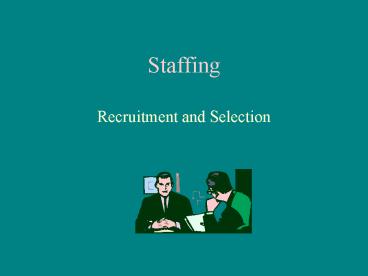Staffing - PowerPoint PPT Presentation
1 / 18
Title:
Staffing
Description:
What other findings were revealed about recruiter decision making? ... Recruiter qualities: demographics, job held, personality/behavioral traits, attitudes, training ... – PowerPoint PPT presentation
Number of Views:664
Avg rating:3.0/5.0
Title: Staffing
1
Staffing
- Recruitment and Selection
2
Strategic Issues in Staffing
- Make or buy decisions
- Integration with firm strategy and other HR
systems - Effect of external environment on staffing
- Extent of use of untapped labor sources and
contingent workers - Extent of use of technology in staffing
- Hire for job or for organization or both?
- Attraction-Selection-Attrition (ASA) Model
3
Recruitment
- Locating, identifying, and attracting applicants
to an organization - Good recruitment processes generate large enough
pools of qualified individuals so that
satisfactory applicants may be selected - Additional purposes screening applicants, sell
organization to applicants, and build
organizational reputation
4
Steps in Recruitment
- Situational and job analysis
- List criteria for assessing potential candidates
(KSAOs) - Identify sources and utilize techniques of
recruitment (internal vs. external) - Evaluate the recruitment process
5
Recruitment Process
Human Resource Plan
Recruiter and Manager Review Job Description and
Specifications
Check Internal Sources
Contact External Sources
Follow up and Evaluation
6
Recruitment Sources
- Internal Sources
- Current employees
- Friends/family of current employees
- Former employees
- Previous applicants
- Advantages
- Disadvantages
- External Sources
- Advertising in media
- School/college recruiting
- Employment agencies
- Unions and trade associations
- Internet
- Advantages
- Disadvantages
7
What are recruiters looking for in an applicant?
- Kristof-Brown article of P-J and P-O fit
- What do recruiters look for in P-J fit?
- What do recruiters look for in P-O fit?
- Can recruiters distinguish between the two?
- Does P-J or P-O fit have more impact on hiring
recommendations? - What other findings were revealed about recruiter
decision making?
8
What are applicants looking for in terms of jobs
and recruitment practices?
- Boswell et al. 2003 tracked job choice decisions
of applicants as they unfolded - What factors affect job choices?
- Do these change during the job choice process?
- What impact does treatment during the recruitment
process have? - What are the effects of deadlines for job
decisions?
9
Summary of Important Aspects of Recruitment
Process
- Recruiter qualities demographics, job held,
personality/behavioral traits, attitudes,
training - Content of the recruitment message organized
and informative about job and organization - Applicant perceptions communication during the
process relationship building is important early
in process delays and no follow up are negative
factors deadlines for job decisions dont matter - Quality of site visit is important to applicant
- Organizational characteristics such as
reputation, location, firm size, and industry
matter
10
Evaluation of Recruitment
- Yield ratios
- Yield ratios by source
- Time lapse data
- Others
- recruitment cost per hire
- individual recruiter activity/efficiency
- analysis of geographical source
- number of minority/women applicants per source
- applicant satisfaction
11
Contemporary Challenges to the Recruitment Process
- Jobs and organizations are moving targets
- Increasingly under-skilled workforce for jobs
available - Workers needs for work/life balance
- Solutions
- Casting a wider net consider global outsourcing
- Capitalizing on technology
- School/employer partnerships
- Creating a better place to work
12
Selection Process
- The collection and evaluation of information
about an individual in order to extend an offer
of employment or promotion to another position - Legal, socio-economic, educational, political,
and scientific factors affect selection processes - Knowledge of HR staff and costs also play a role
13
Steps in the Selection Process
- Job and organizational Analysis
- Develop selection criteria (KSAOs)
- Choose/develop selection instruments
- Ensure validity, reliability, utility, and
fairness - Collect data on each candidate
- Analyze data and select candidate
14
Typical Selection Methods
- Evaluate on
- Validity
- Cost
- Ease of administration
- Adverse impact on protected groups
- Applicant acceptance
15
Typical Selection Methods
- Application Blanks and Resumes (Bio-data)
- Reference and Background Checks
- Physical Ability Tests
- Standardized Cognitive Tests
- Work Samples
- Interviews
- Personality Tests
- Assessment Centers
- Honesty Testing
- Drug Testing
- www.kahntactmet.com/
http//www.wonderlic.com/
16
Current Selection Issues
- Work characteristics affect the extent of use and
what kinds of selection methods that are used by
employers (Wilk Capelli, 2003)
Testing Performance Academic Achievement Work
Experience
Skill Requirements
Testing Performance Academic Achievement
Amount of Training
Testing Performance Work Experience
Pay Levels
17
Current Selection Issues
- Current and future trends (Lievens et al., 2002)
- Effects of labor market shortages
- Fit perspectives and marketing perspectives
- Technological developments
- Computerized testing, virtual reality testing,
internet recruiting - Little research available on effectiveness,
adverse impact, equivalence to paper-pencil
methods, effects on privacy concerns
18
Current Selection Issues
- Current and future trends (Lievens et al., 2002)
- Applicant perceptions of the process
- Has practical consequences in terms of motivation
and performance in the selection situation,
applicant attraction to the organization,
socialization of new hires, etc. - Validity approaches
- Need more focus on construct validity
understanding the underlying attributes that
methods are measuring - Examples Big Five Personality, AC dimensions,
situational interviews, structured vs.
unstructured interviews































